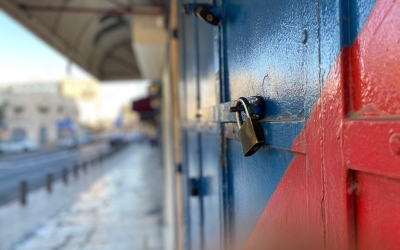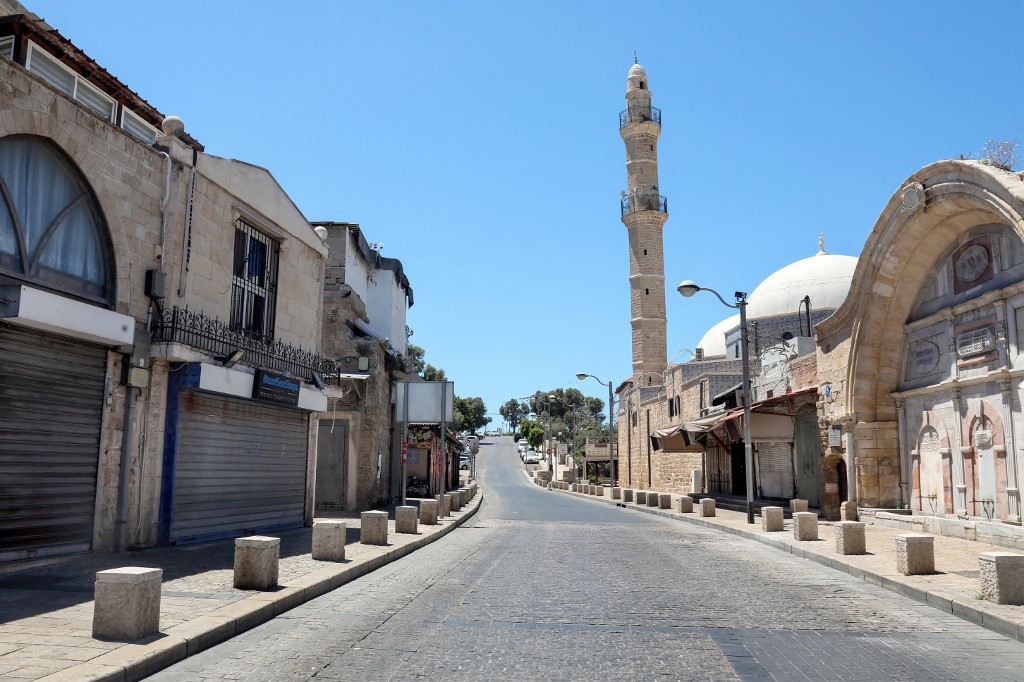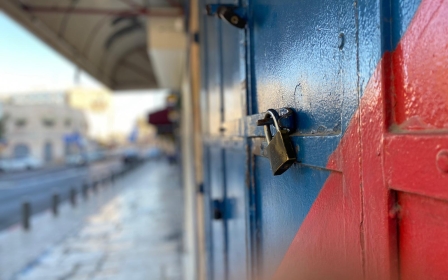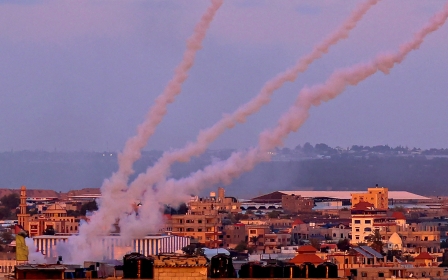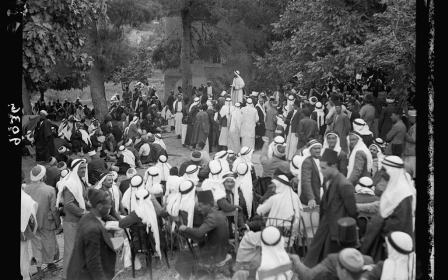Palestinian citizens of Israel fired for participating in general strike
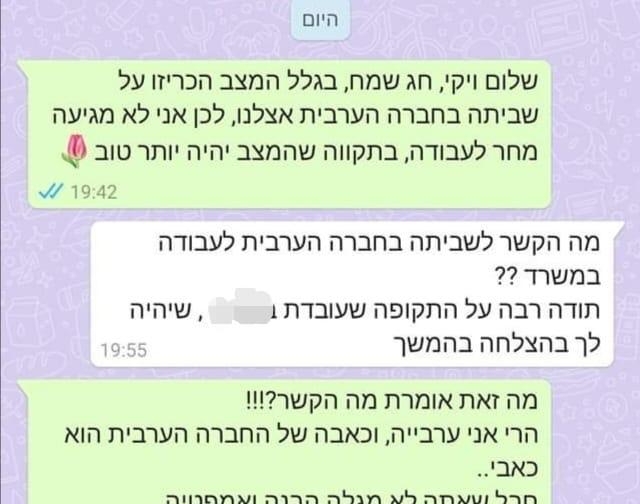
"Hundreds" of Palestinian citizens of Israel have received WhatsApp messages from their Israeli employers firing them from their jobs after participating in a general strike on Tuesday that was adhered to by millions of Palestinians across the occupied Palestinian territories and Israel.
Middle East Eye has seen tens of messages in Hebrew by Palestinian workers who informed their Israeli employers that they would not be attending work on Tuesday due to the general strike, only to receive messages shortly afterwards informing them that they were fired.
The karameh strike - "dignity strike" in Arabic - was called on Tuesday across historic Palestine to show Palestinian unity amid ongoing Israeli bombardment of the besieged Gaza Strip and violent crackdowns on Palestinian protesters elsewhere.
The Arab Follow-up Committee, which coordinates between political parties inside Israel, called for the strike and asked 1.6 million Palestinian citizens of Israel, who make up 20 percent of the country, to adhere to it.
The Palestinian Authority (PA), civil organisations, and political factions in the West Bank and Jerusalem also joined in.
Mohammad Zeidan, the former director of the Arab Association for Human Rights, told MEE that legal representatives and civil society organisations were documenting and gathering cases of Palestinian workers who were fired abruptly by their Israeli employers.
'Some Israeli employers just replied with ‘you’re fired’ messages
- Mohammad Zeidan, activist
"I can't give you an exact number of how many workers were fired through WhatsApp messages, but it could reach hundreds," Zeidan told MEE over the phone from Nazareth.
"Some Israeli employers just replied with ‘you’re fired’ messages, while others engaged in a political debate with Palestinian workers, telling them that they’re not loyal to Israel," he added.
The general strike brought some sectors of the Israeli economy to a standstill on Tuesday - notably construction and delivery services, as hundreds of Palestinian truck and transportation drivers or crane operators went on strike.
Roaa Jbara, a member of a volunteer group of Palestinian Lawyers Inside Israel, told MEE that several workers in the Israeli private and public sectors had approached the organisation for legal advice before joining the general strike.
Jbara said that they had confirmed cases of Palestinian workers who were fired after sharing posts on social media.
"Workers who could not reach work because of the latest events were also fired, and those who shared photos of protests on social media or joined in with the protests were threatened with being fired," Jbara said.
Evolving protests
Palestinians inside Israel have been protesting since early May. At first, this was against plans to evict Palestinians from their homes in the neighbourhood of Sheikh Jarrah, and then against Israeli air strikes on civilians in the Gaza Strip.
The situation then developed into confrontations between Palestinians and far-right Israeli mobs backed by settler groups who travelled from illegal settlements in the West Bank to over 20 cities where both Palestinian and Jewish citizens of Israel live, including Nazareth, Haifa, Jaffa, Lydd, Tayba and Sakhnin.
Hundreds of Palestinian citizens of Israel have been arrested and injured and two were killed in Lod - which Palestinians call Lydd - and Umm al-Fahm, as ultra-nationalist Israelis vandalised Palestinian cars and homes.
'The situation is tense and some workers did not go to work for fear of being attacked when using public transport'
- Jamal Zahalka, president of Balad
Palestinian residents of Lydd set fire to a synagogue last week, which was followed by the Israeli government deploying the army onto the streets of the city and placing it under curfew.
Since 7 May, 27 Palestinians have been killed by Israeli fire in the West Bank and East Jerusalem, and two inside Israel.
Jamal Zahalka - the president of the National Democratic Alliance (Balad), a party representing Palestinian citizens of Israel in the Israeli parliament - told MEE that a group of Palestinian workers forwarded to him dismissal messages in the past few days.
"The situation is tense and some workers did not go to work for fear of being attacked when using public transport," Zahalka said.
"We demand that the Israeli government rein in settlers who attacked our people in the cities of the Palestinian coast, including Jaffa, Lydd, Ramla, Acre, and Haifa," he added.
"The main problem in these cities is that Israel has planted extremist Jewish settlers in Palestinian neighbourhoods. They attacked Palestinians when events erupted and were later joined by settlers from the West Bank and protected by Israeli police."
State of fear
Zahalka added that Palestinian citizens of Israel were living in a state of fear, worried about being attacked if they were to shop in Israeli malls, use public transport, or stop to fuel their cars at gas stations.
"This is not a civil war. It is an Israeli war on us… The Palestinians inside Israel do not have an organised power, nor police and weapons to defend themselves against armed police and settlers," he added, when asked about a term widely used to describe the confrontations in Israel's mixed cities.
Zeidan said that most Palestinian workers inside Israel had to travel daily to their work in Jewish-majority Israeli towns.
"Let's say a pharmacist from Kafr Qasem had to travel to work in Hadera, which is an Israeli town - they would put themselves at risk of being attacked," he said.
Zeidan noted that according to Israeli Labor Law, a worker should be offered a hearing before being dismissed from their job. "There's a law from 1988 that says employers can’t fire a worker because of their political, religious or national positions," he noted.
Jbara also told MEE that, though a hearing meeting is part of the procedure to dismiss workers, Israeli law could still be interpreted in these cases in favour of the employers.
"The law could be swung left or right, and the employers can say that a Palestinian worker did not attend work, not because of the tense situation in the country, but because he was on strike… this will need evidence," Jbara said.
The Follow-Up Committee recently released data showing that Palestinians make up 50 percent of all pharmacists, transport and construction workers in Israel, and 11 percent of civil servants and members of the police.
'Firings are illegal'
Palestinians also account for 13,000 nurses and 8,140 doctors in Israel, making up 23 percent and 21 percent of the workers in these sectors respectively. Meanwhile, 29,000 Palestinian citizens of Israel work in tech, making up 9.2 percent of employees in the sector.
Adalah, the Legal Centre for Arab Minority Rights in Israel, told MEE that it sent a letter to Israeli Attorney General Avichai Mandelblit and other senior officials "demanding they issue a clear directive to the general public that firings due to participation in a strike are illegal, disproportionate, and constitute a criminal offence".
Sawsan Zaher, deputy general director of Adalah, told MEE that Israeli law does not recognise a political strike.
"Workers had to take it as an annual or sick leave," she said. "We have asked Israel’s attorney general to issue a clarification that the strike is in line with a 1988 law which bans discrimination against workers when they are employed or dismissed because of their political opinion, and that this is considered an offence."
Zaher said that this not the first time Israeli employers have fired Palestinian workers during a time of conflict.
"This happened in the last Israeli war on the Gaza Strip in 2014. Some workers who posted [on social media] about the war were threatened to be fired, or were fired, or faced racist remarks from their employers."
Middle East Eye propose une couverture et une analyse indépendantes et incomparables du Moyen-Orient, de l’Afrique du Nord et d’autres régions du monde. Pour en savoir plus sur la reprise de ce contenu et les frais qui s’appliquent, veuillez remplir ce formulaire [en anglais]. Pour en savoir plus sur MEE, cliquez ici [en anglais].


